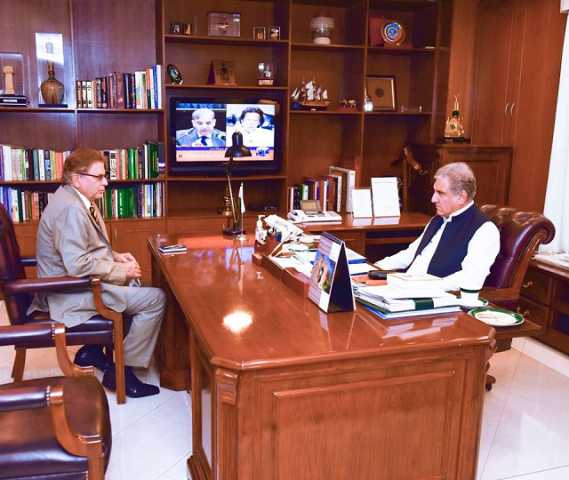Govt appoints Muhammad Sadiq as country’s first special representative for Afghanistan
Sadiq served as Pakistan’s ambassador to Kabul from 2008 to 2014

PHOTO: Radio Pakistan
Soon after his appointment, Sadiq on Saturday met Foreign Minister Shah Mehmood Qureshi, who said Pakistan would continue to play its role for the peace and stability in Afghanistan.
The appointment of Sadiq was made just days before the visit of US point person for Afghanistan Zalmay Khalilzad, who is travelling to Kabul, Doha and Islamabad to advance peace efforts.
Sadiq, although appointed special representative for Afghanistan, has been a key interlocutor from Pakistan, playing his role from behind the scenes.
He has vast experience in dealing with Afghan affairs since he served Pakistan’s ambassador to Kabul from 2008 to 2014. To his credit, he played an instrumental role in removing the mistrust between non-Pashtun parties of Afghanistan including the Northern Alliance and others.
Sources say his close contacts with different players of Afghanistan played a role in giving him the new responsibilities.
Foreign Office sources believe the role of special representative will not be ceremonial, instead, Sadiq will be the focal person from Pakistan dealing with Afghan issues.
He remained part of Pakistan’s efforts to bring the Taliban on to the negotiating table when President Trump in late 2018 requested Pakistan for assistance to jumpstart the peace process.
After over nine of months of talks between the US and the Taliban, the two sides signed a landmark deal on February 29 in Doha. The deal envisages a time table for US troop withdrawal from Afghanistan in return for the Taliban agreeing not to allow Afghan soil to be used again by terrorist groups.
One key clause of the agreement has been the prisoners' exchange between the Afghan Taliban and the government. Under the agreement, the Afghan government was to free 5,000 Taliban fighters while insurgents were also supposed to release 1,000 Afghan security personnel. The process hit a roadblock when President Ghani initially refused to honour the deal.
The delay in the prisoner swap prevented the start of much needed intra-Afghan dialogue. But the process is back on track after Ghani agreed to free prisoners while his internal differences with Dr Abdullah Abdullah had also been resolved.
Abdullah, the former chief executive, is now spearheading Afghanistan’s peace efforts. He would lead the Afghan delegation at the talks with the Taliban whenever they take place.



1724319076-0/Untitled-design-(5)1724319076-0-208x130.webp)















COMMENTS
Comments are moderated and generally will be posted if they are on-topic and not abusive.
For more information, please see our Comments FAQ